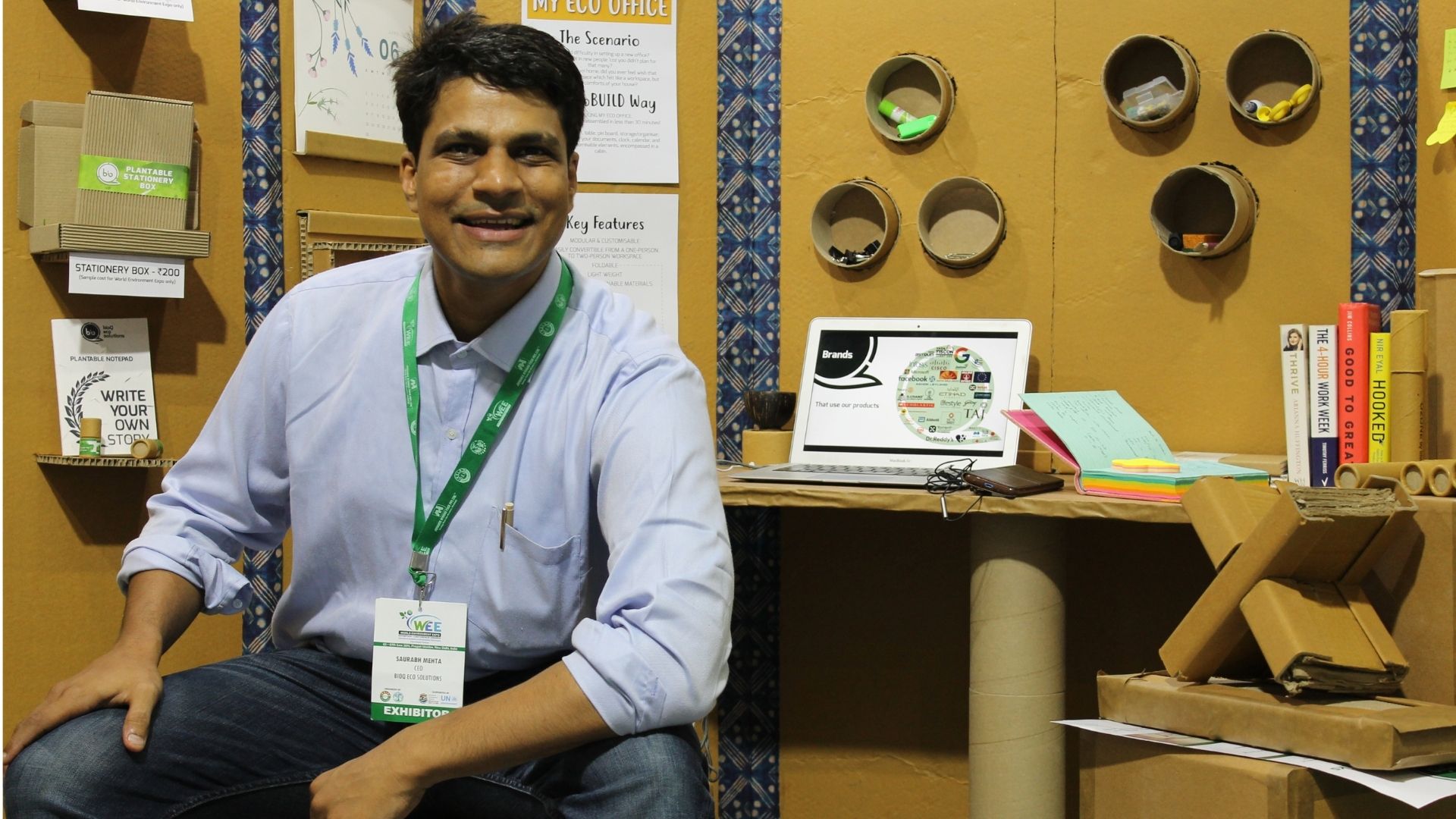Nexus-trained bioQ redesigns daily-use products to create ecofriendly options.
November 2019

Saurabh H. Mehta’s bioQ creates ecofriendly stationery using sustainable materials. Courtesy bioQ
There is a rapidly growing interest in using products made from ecofriendly, sustainable materials in India. One company, bioQ, is positioning itself as a leader in innovation in this field. It redesigns daily-use products using sustainable materials like paper and agricultural waste. Currently focused on creating ecofriendly stationery, bioQ plans to expand into sectors like furniture, edible cutlery and building blocks. The New Delhi-based start-up has received training at the Nexus Incubator start-up hub at the American Center New Delhi.
Excerpts from an interview with the company’s founder and chief executive officer Saurabh H. Mehta.
What is the status of market interest in ecofriendly and sustainable products in India?
More and more people are looking for ecofriendly alternatives for most products. Consumers are also actively influencing businesses and entities around them to switch to these alternatives.
What role has bioQ been playing in this sector?
We were among the first to introduce pencils and pens with recycled paper bodies instead of wood or plastic. We also came out with notebooks with seed paper covers as well as calendars with seed paper sheets for each month, which could be planted once that month was over. These innovative products received widespread appreciation.
Our core focus has been on stationery and corporate gifting till now. In less than a year after launch, we are selling one plantable product every five seconds.
#MakingTraditionsGreener, launched around Diwali last year, is our attempt to provide greener and ecofriendly means of celebrating Indian festivals with plantable products. This has received a lot of praise and has helped us think in many new directions.
Could you talk about the start-up process?
I have been working in the field of environment and sustainability for over 10 years now. In 2017, I was asked to come back to Delhi and join the family business of making plastic disposable ball pens. Within a few months, I realized that this is not what I can do for the rest of my life and started exploring ecofriendly alternates to stationery products. After one year, bioQ was started as a separate entity, which focused aggressively on developing ecofriendly products.
How has Nexus Incubator helped with your work?
Before joining Nexus, bioQ was spreading horizontally in different directions and lacked focus. The first thing that the Nexus program helped us achieve was focus—finding and realizing the right channels and how to capitalize the most out of what is already there. The way the 10-week program was structured actually made us go out of the way and do certain things like interviewing various stakeholders to gain new insights, which we wouldn’t have done otherwise.
Regular practice sessions on communicating ideas effectively was definitely helpful in getting clarity about our business. The cohort, as a whole, also became a strong support structure, wherein everyone was willing to help out and learn from each other.
Which has been your most successful innovation so far?
bioQ is a product design company, and innovation is a part of everyday business. Thus, it’s difficult to really say which is the most successful innovation.
Commercially, we have had good success with the plantable stationery series—recycled paper-based pens, pencils and notepads that have seeds embedded in them. We have tried to change the philosophy from “use and throw” to “use and grow.”
We feel that nutri cups, cutlery that you can eat after eating your food with it; the ZERO plastic pen, which is made with only recycled paper; and the cardboard-based collapsible, plug-and-play furniture system, which have had highly successful beta launches, hold huge potential for the company in the coming months.
We are spending aggressively on research and development, and the team is working on edible cutlery for parties, recycled paper-based furniture and some other exciting innovations in the writing instrument space. These can have a significant positive impact on the environment.
India is a huge market and has strata of buyers. While some are price-sensitive, others are willing to try new things if these excite them and help them go green.
Trevor Laurence Jockims teaches writing, literature and contemporary culture at New York University.
COMMENTS